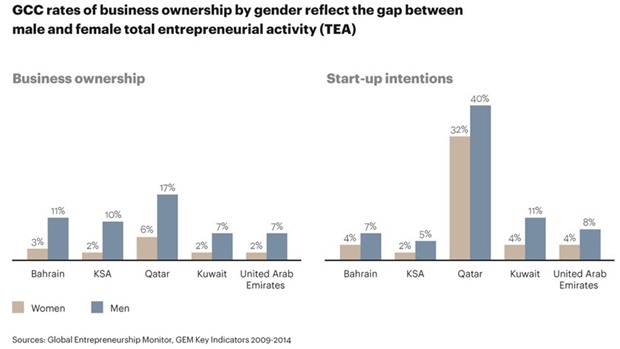A significant number of Qatari females have business startup intentions to become entrepreneurs, a new study has shown amid the relatively low level of female entrepreneurship in the GCC region.
In Qatar, 32% of the female population has start-up intentions compared to 40% of the men, according to AT Kearney.
Despite recent progress, rates of female entrepreneurship in the GCC (Gulf Cooperation Council) have remained low compared to the rest of the world.
In 2009, the GCC - at only 3.5% - fell well below the global average of 8.8%. At 10.5% in 2014, the GCC managed to approach the global average of 11.8%, but still remained far behind other regions of the world, particularly Latin America, the Caribbean and sub-Saharan Africa.
More striking than low rates of female TEA (total entrepreneurial activity), the GCC faces the greatest gap between male and female TEA in the world. The global average ratio of male to female TEA is 2.1 to 1, with 2.1 male entrepreneurs for every female entrepreneur.
In Saudi Arabia, for instance, this ratio is 10 to 1.8.
Across the GCC, rates of business ownership by gender reflect this discrepancy, AT Kearney said. In the UAE and Kuwait, there is a 5% difference in business ownership between the male and female populations, with 2% of women owning businesses compared to 7% of men.
In Bahrain and Saudi Arabia (KSA), the difference is 8%, and in Qatar the difference is 11%.
However, the difference in startup intentions across GCC countries is smaller.
In every country except KSA, rates of female startup intentions are higher than rates of actual female business ownership.
The results of the AT Kearney study suggest that this discrepancy is due to lack of opportunity. Almost 70% believe there is still a wide gap between the opportunities enjoyed by male and female entrepreneurs. When asked to explain why, most respondents highlighted mostly cultural reasons, saying women were not encouraged to become entrepreneurs.
In addition to cultural barriers, women are also impacted by the broader systemic challenges faced by all entrepreneurs in the region.
In the ‘2015 Ease of Doing Business Report’ published by the World Bank, the UAE ranked 58 out of 189 economies for “ease of starting a business” with the other GCC countries ranking between 100 and 150. The mean score across the GCC was 84.10.
Entrepreneurs from the GCC region highlight three specific challenges, AT Kearney said. Access to capital is the most significant challenge with more than 70% of entrepreneurs from this region identifying it as central. Additionally, 62% of regional entrepreneurs consider bureaucratic procedures and red tape a key obstacle.
In the UAE specifically, 68% of entrepreneurs say finding talent is a major hurdle. This sentiment is echoed by businesses outside of the region attempting to expand into the GCC.
For female entrepreneurs within the region, these fundamental challenges are exacerbated. Leveraging mentors to gain access to capital is widely acknowledged to support entrepreneurs. Finding mentors for women entrepreneurs within the GCC countries is challenging.
In Bahrain, for example, 57% of male entrepreneurs report having access to a mentor, compared to 38% of female entrepreneurs.
In the other GCC countries, the discrepancy is lower and ranges between nine and 15%.
The report noted there are also some visible efforts in the GCC region to develop a more robust ecosystem for female entrepreneurs, with the UAE, Qatar, and KSA leading the way.
Selected examples include WOMENA, an angel investor group for women only, based in the UAE; Hadafi, a KSA-based female entrepreneurship development programme; and the Roudha Center, a Qatari source for financial and legal advice and training for female entrepreneurs.
As of now, many of ongoing initiatives are aimed at both male and female entrepreneurs, with few specifically targeting women.
Going forward, AT Kearney said more focused support for female entrepreneurs would be crucial, targeting the specific development areas: financing, mentorships and networking and international opportunities.
“However, for female entrepreneurship in the GCC to realise its full potential, there will also need to be a cultural shift toward supporting female innovation and entrepreneurial aspirations,” AT Kearney said.

..
